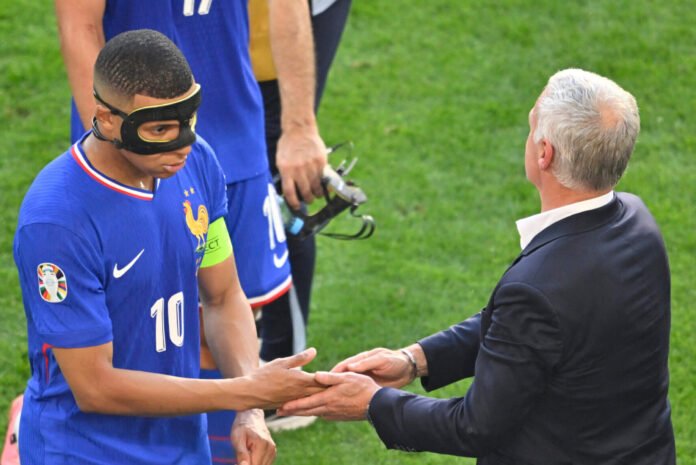It was just over two decades ago, 30km down the road here from Dortmund, that Didier Deschamps contested his first major final as a manager. His Monaco side were defeated 3-0 by Jose Mourinho’s Porto in Gelsenkirchen in the most unlikely final of the Champions League era. The surprising thing, looking at 2004 from a 2024 perspective, was that both those managers exhibited an attacking style of play.
Deschamps’ reputation is now that of the most cautious manager in top-level football — even more cautious than Mourinho. This has largely served him well, considering he’s France’s longest-serving manager, won the World Cup in 2018, reached another final in 2022 and only lost on penalties, and also reached the final of Euro 2016 on home soil. When you consider how poor France were in 2008, 2010 and 2012, we shouldn’t underestimate his achievements.
Just like in his playing days, Deschamps has never cared too much about being considered flashy. But that’s not the sole criticism this time around. Now, the fear is that France are not merely boring, but actually not particularly good. In three matches thus far, they’ve struggled to produce a single genuinely convincing half of football. In a 1-0 win over Austria they survived an early battering. In the 0-0 draw with the Netherlands they relied on a controversially disallowed Xavi Simons goal. Here in Dortmund they stumbled to a 1-1 draw with Poland, who had already been eliminated.
France were unlucky to be thwarted by a man-of-the-match goalkeeping performance from Lukasz Skorupski, and also can feel aggrieved that Mike Maignan was penalised for coming off his line too early when Robert Lewandowski seemed to illegally stall his run-up. Thus far, however, things haven’t been good enough.
Being solid defensively and relying on moments of magic from individuals in attack has been a perfectly viable strategy at international level over the past decade or so. The question is whether the international game has, at last, started to catch up with club football. The notable aspects of the group stage have all been positive, in terms of underdogs competing, in terms of pressing, in terms of rotations in attack and being able to punch above their weight through a cohesive attacking plan. It’s difficult to see any of that from France.
Today, Kylian Mbappe, playing as the No 9, tried to do almost everything himself. He came short, he drifted left, he ran in behind and he shot from distance. There was little sign that he was working particularly well with any of his team-mates, exemplified by when he nipped in ahead of his own team-mate Bradley Barcola to have a shot at goal towards the end of the first half.
Deschamps’ hasn’t had the answer at Euro 2024 so far (Antonin Thuillier/AFP/Getty Images)
Barcola was bright but lacks end product for now — which is natural after 18 months of top-flight football — but there’s less excuse for Ousmane Dembele, now 27. When put through on goal in the first half by N’Golo Kante, his finish was poor. His crossing was worse. Seven years on from such an excellent season at this stadium that Barcelona decided to spend more than €100million (£84m; $107m) on him, Dembele still just feels like a straight-line dribbler. Jakub Kiwior’s needless clumsy challenge on him, which brought the penalty Mbappe scored, was surely the only way Dembele was going to contribute to a goal.
Kante was man of the match in France’s first two matches and again bright here with his dribbling and ability to burst into attack. On three occasions, however, his passing was almost embarrassingly bad.
France do have players who connect their attacks. Olivier Giroud, seemingly a back-up at this tournament, does that with his hold-up play. Marcus Thuram played the Giroud role effectively against Netherlands with some clever back-to-goal play. Antoine Griezmann is now an elegant midfielder more than a forward, capable of playing neat chipped passes into attack. He was surely rested, rather than dropped, for this game.
France always get better in the knockout stage, and there’s a long list of teams who performed poorly in their group before coming alive later on. Most obviously, Portugal won this tournament eight years ago despite squeezing through as one of the best-third-placed sides with three draws.
But it’s not merely about whether this performance promises much for the future — this result in itself has been seriously damaging. France are now on the same half of the draw as Spain, Germany and Portugal, probably the three most impressive sides in the group stage. Deschamps’ side might still win this tournament. If not, we’ll be able to trace their failure back to this inability to defeat an already eliminated side, and the fact they’ve managed two goals from three matches — an own goal and a penalty.
That, for a side with this level of attacking talent, at a tournament that has been full of goals, makes you yearn for the France of 2000, and the Deschamps of 2004.
(INA FASSBENDER/AFP via Getty Images)
Read the full article here


